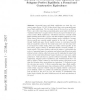1573 search results - page 77 / 315 » Signs and Formal Concepts |
ISEMANTICS
2010
13 years 5 months ago
2010
With the advent of Web 2.0 and the emergence of improved technologies to enhance UI, the importance of user experience and intuitiveness of Web interfaces led to the growth and su...
IIE
2007
13 years 10 months ago
2007
How do we teach children to express and communicate ideas in a formal and informal mode? What type of language do they need in a concrete context? How should they determine a prope...
CORR
2007
Springer
13 years 10 months ago
2007
Springer
Abstract. Sequential game and Nash equilibrium are basic key concepts in game theory. In 1953, Kuhn showed that every sequential game has a Nash equilibrium. The two main steps of ...
KR
1992
Springer
14 years 2 months ago
1992
Springer
Abstract, We consider the problem of integrating Reiter's default logic into terminological representation systems. It turns out that such an integration is less straightforwa...
ENTCS
2006
13 years 10 months ago
2006
Conventional approaches to the modeling of autonomous agents and agent communication rely heavily on the ascription of mental properties like beliefs and intentions to the individ...

